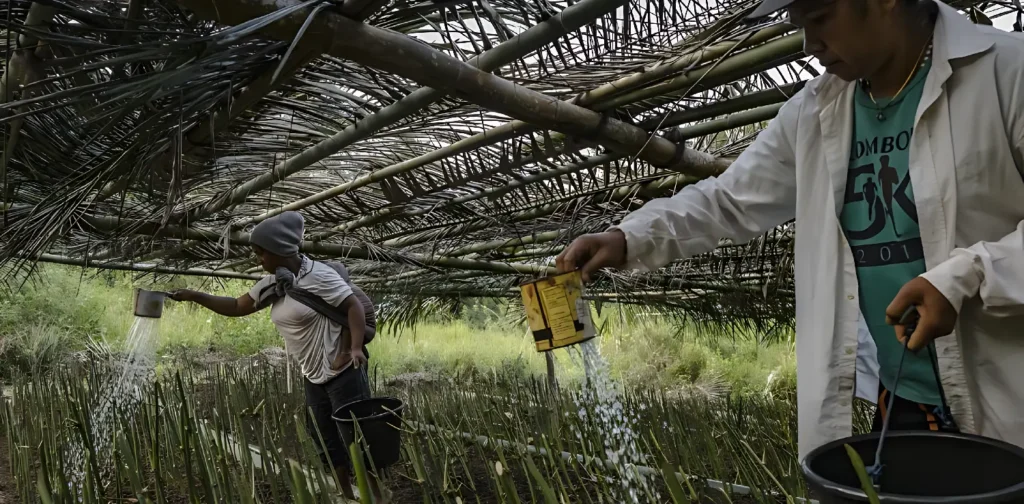Mama Bambu: How Women in Flores, Indonesia Take Part in Environmental Conservation

Photo: Documentation from Environmental Bamboo Foundation.
Women’s role is instrumental in climate mitigation and adaptation, especially amidst the ongoing global crises. Their roles are especially crucial in strengthening economic resilience and environmental conservation. In Flores, East Nusa Tenggara, Indonesia, hundreds of women strive to mitigate the impacts of climate change and elevate their households’ economies through the bamboo nursery program. They call themselves “Mama Bambu” (Bamboo Mamas).
Bamboo’s Potential for Climate Mitigation
Indonesia has an estimated over 1 million hectares of bamboo, with 176 species spread across various regions. However, only 25,000 hectares are managed as forests or gardens.
Bamboo can help with climate management. Research has shown that bamboo has the potential to absorb and store carbon dioxide. This storage can last for a long period, even when the bamboo has transformed into products or used as parts of construction. Bamboo can also be transformed into bioenergy and contribute to land restoration due to its ability to grow fast in degraded lands.
Moreover, bamboo is essential for soil and water conservation because it can absorb up to 90% of rainwater. Its litter (thick pile of leaves) and strong roots can reduce soil erosion rate by retaining moisture and binding the soil.
The Roles of Mama Bambu
In 21 villages across seven districts in Flores, East Nusa Tenggara, bamboo unites hundreds of women in protecting the environment and improving their family’s economy. They are Mama Bambu (Bamboo Mamas), women, especially housewives from poor families and widows without permanent work, who are empowered in the bamboo nursery program by Yayasan Bambu Lingkungan Lestari (YBLL/Environmental Bamboo Foundation) with the support of the East Nusa Tenggara Provincial Government.
The program has several objectives: to produce bamboo seedlings for land rehabilitation and water source protection, provide an alternative income source for villagers involved, and turn villages into a green economy initiative with bamboo as the main commodity.
The program was launched in the middle of 2021. In a year, the women of Mama Bambu had produced up to 2.5 million bamboo seedlings and rehabilitated 80,000 hectares of land. Lands in critical condition have now transformed into fertile areas that can be planted with various types of plants, such as fruit, vegetables, and tubers. In the long term, bamboo widely planted near water sources can also increase water discharge to help maintain water availability for residents during the dry season.
Mama Bambu’s Hard Work
Behind these achievements is Mama Bambu’s hard work. At the start of the program, the women of Mama Bambu had to go through the forest to look for bamboo mother plants and experience failures during seeding. However, after receiving training, they managed to grow an average of 8,000 seeds per person. Behind every seed that successfully grows is an incentive, with each person earning up to IDR 20 million.
Not only that, the women of Mama Bambu are also given various training outside of the bamboo nursery. They are taught about agroforestry and factory-integrated bamboo products, bamboo charcoal development, bamboo preservation, and fiber weaving.
Bamboo breeding and planting in East Nusa Tenggara continues. In 2023, YBLL planted bamboo across 27 hectares of land, including barren lands, lands near water sources and riverbank areas, and hillsides. The planting resumed in February 2024, adding 500 hectares of land and involving local farmers. It aims to support Forest and Other Land Use (FOLU) Net Sink 2030.
Encouraging Women’s Participation
For the women of Mama Bambu, the bamboo nursery program does not only teach them about independence and resilience. It is also a form of respect for their ancestors. For example, women in Ngada Village who are entrusted with managing Ngia Ngora (Indigenous land) and Napu Bheto (bamboo forest) are also protecting their ancestral heritage and customs and future generations.
Mama Bambu showcases the importance of involving local communities as the main actors in efforts to overcome climate change. This has become more urgent, especially since women bear multiple burdens from the impacts of climate change. Therefore, supporting women’s involvement, from planning and implementation to evaluation, in making climate mitigation policies or programs is important in realizing climate justice.
Editor: Abul Muamar & Nazalea Kusuma
Translator: Kresentia Madina
The original version of this article is published in Indonesian at Green Network Asia – Indonesia.

Co-create positive impact for people and the planet.
Amidst today’s increasingly complex global challenges, equipping yourself, team, and communities with interdisciplinary and cross-sectoral insights on sustainability-related issues and sustainable development is no longer optional — it is a strategic necessity to stay ahead and stay relevant.


 Reframing Governance in the Era of Water Bankruptcy
Reframing Governance in the Era of Water Bankruptcy  Strengthening Resilience amid Growing Dependence on Space Infrastructure
Strengthening Resilience amid Growing Dependence on Space Infrastructure  Indian Gig Workers Push Back Against 10-Minute Delivery Service Strain
Indian Gig Workers Push Back Against 10-Minute Delivery Service Strain  Call for Governance: Grassroots Initiatives Look to Scale Efforts to Conserve Depleting Groundwater
Call for Governance: Grassroots Initiatives Look to Scale Efforts to Conserve Depleting Groundwater  Integrating Environment, Climate Change, and Sustainability Issues into Education Systems
Integrating Environment, Climate Change, and Sustainability Issues into Education Systems  Finally Enforced: Understanding the UN High Seas Treaty
Finally Enforced: Understanding the UN High Seas Treaty